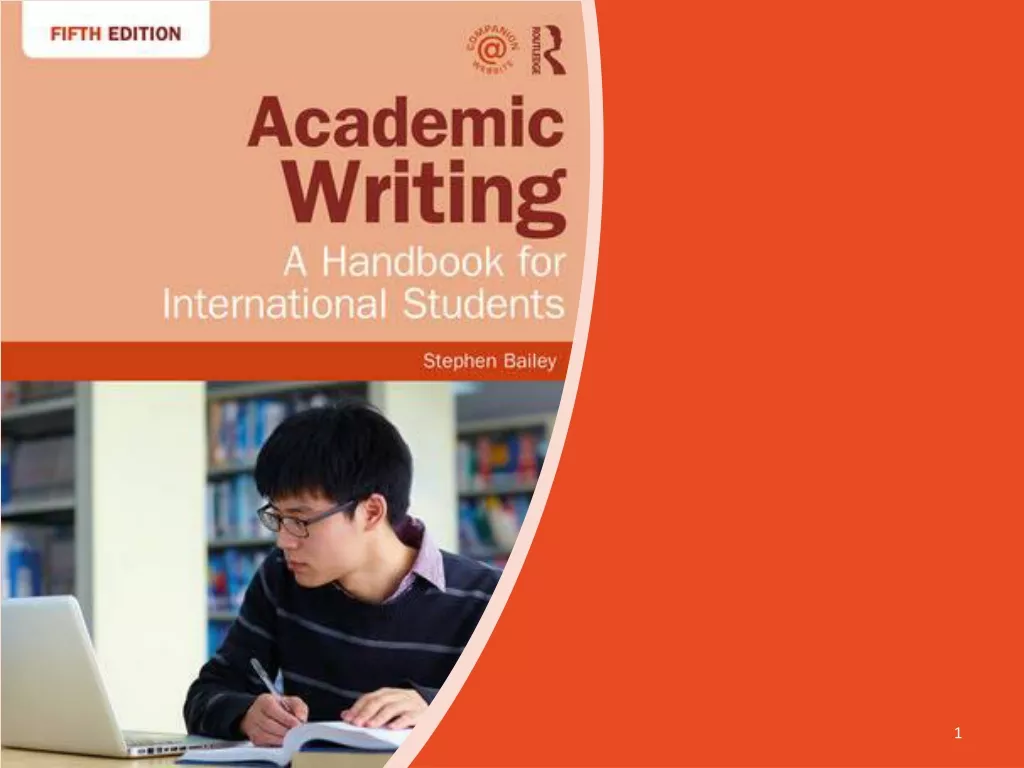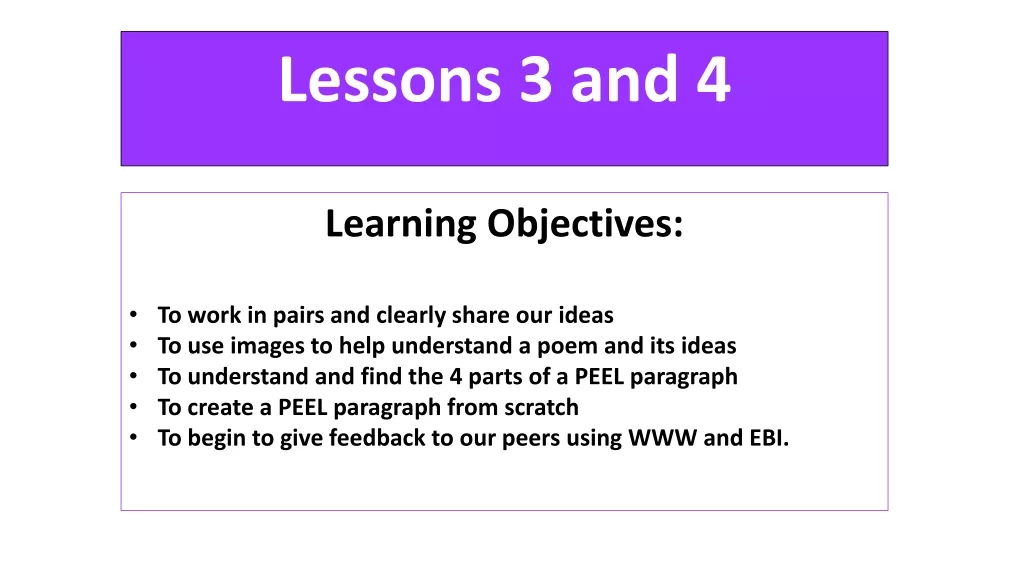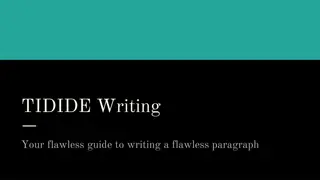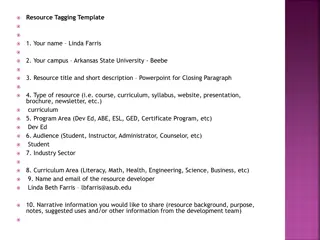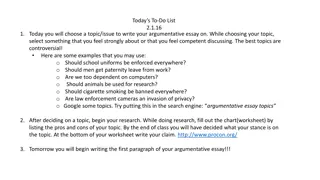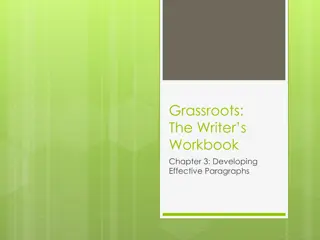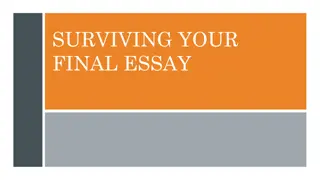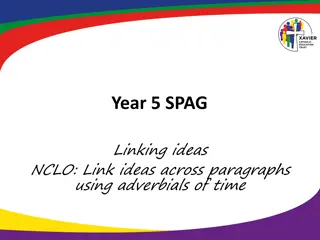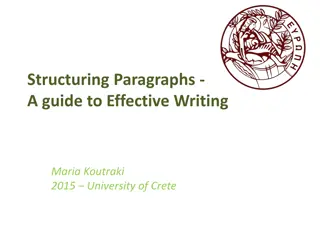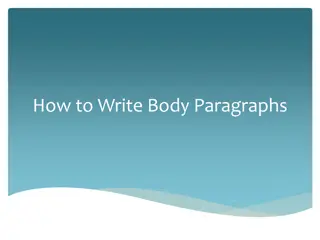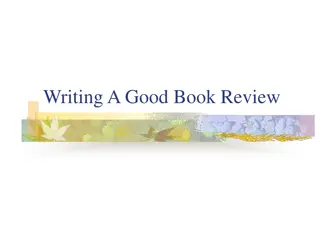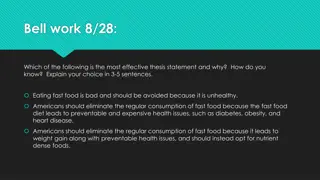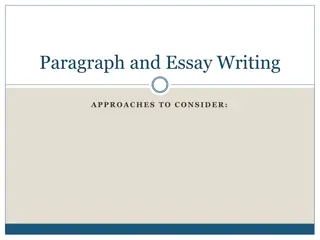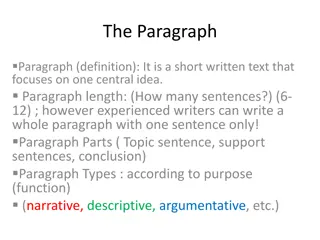Effective Strategies for Engaging Introductory Paragraphs in Writing
Crafting an engaging introductory paragraph is vital in capturing the reader's attention from the start. This article explores four effective strategies for creating impactful introductions: storytelling, posing thought-provoking questions, contrasting perspectives, and transitioning from general to specific. By implementing these tactics, writers can set the tone for their piece and draw readers in effectively.
Download Presentation

Please find below an Image/Link to download the presentation.
The content on the website is provided AS IS for your information and personal use only. It may not be sold, licensed, or shared on other websites without obtaining consent from the author. Download presentation by click this link. If you encounter any issues during the download, it is possible that the publisher has removed the file from their server.
E N D
Presentation Transcript
Introductory Paragraph Strategies in writing introductory Dr. Retno Purwani Sari, M.Hum.
1. Telling a brief story Eric, a new boy at school, was shy and physically small. He quickly became a victim of bullies. Kids, would wait after school, pull out his shirt, and punch and shove him around. He was called such names as Mouse Boy and Jerk Boy. When he sat down during lunch hour, others would leave his table. In gym games, he was never thrown the ball, as if he did not exist. Then one day, he came to school with a gun. When the police were called, he told them he just could not take it anymore. Bullying had hurt him badly, just as it hurts so many other students. Every member of a school community should be aware of bullying and the three hateful forms that it takes: physical, verbal and social bullying.
2. Asking one or more questions When you were a kid, were you ever pushed around by bigger children? Were you shoved aside in hallways or knocked out of your seat in classrooms? Were you ever called hurtful names like fatso, worm, dogface, or retard? Or were you coldly ignored by other students? Did they turn their backs on you, pretending you did not exist? If the answer to any of these questions is yes, then you were a victim of one of three forms of bullying: Physical, verbal, or social.
3. Shifting to the opposite For many children, school is a happy experience. They like their teachers, they see their friends on a daily basis, and they feel comfortable and welcome. But for the victims of bullies, school is a nightmare. Everyday they must face someone bigger or meaner than they are and endure humiliation in a variety of forms physical, verbal, and social.
4. Going from the broad to the narrow Many unpleasant parts of growing up seem unavoidable. Pimples happen, voices crack, and students worry all the time about their looks and their changing bodies. In time, the pimples disappear, the voices deepen, and the worries recede. But one all-too-common aspect of growing up, bullying, can have lasting negative results. Young people should not have to put up with bullying in any of its forms physical, verbal, or social.
An essay hook Introductory Paragraph
Cuma budaya nonton film jaman sekarang tuh dah bergeser gitu. Kalau dulu nonton film harus di bioskop. Sekarang dimana aja bisa. Gua kalau ke Jakarta sering banget lihat, ada orang kalau nonton tuh di kereta. Lihat ya sambil berdiri, nonton di HP pakai headset. Kadang kalau filmnya lucu suka ketawa- ketawa sendiri. Hahahaha. Lagi nonton Warkop Rebound, Om Indro jadi minion. Ridwan Remin, Suci 7, 2017
What is an essay hook? An essay hook is 1-2 opening sentences of your paper. They serve to capture readers attention and help them decide if they want to continue reading your text (Hanski, 2019).
Your essay introduction Every one of us has told a lie at one point, but because lies always contradict something we know to be true, lies are nearly always exposed, revealing the truth beneath them. Macbeth learns this the hard way. One theme in Macbeth by William Shakespeare is that the truth will eventually come out. Twitter @mistersato411, 2012
2. The fact or statistic Your first paragraph People lie in 1 out of every 5 conversations lasting more than 10 minutes, according to Allison Komet writing for psychology Today Magazine (1997). If Macbeth is any guide, then most of those people are going to get caught because one theme in Macbeth by William Shakespeare is that the truth will eventually come out. Twitter @mistersato411, 2012
3. Anecdote or personal experience Your first paragraph In 1998, President Clinton had an affair and was impeached. Although the affair was not an impeachable offense, Clinton was impeached for lying about it under oath, and the truth came out anyway. The president s crime was small compared to murdering a king, but both men tried unsuccessfully to escape the truth. It caught up with the President, and it caught up with Macbeth. One theme in Macbeth by William Shakespeare is that the truth will eventually come out. Twitter @mistersato411, 2012
4. Rhetorical Questions Your first paragraph Have you ever told a lie? Did you eventually get caught? Macbeth lied about murdering his king and then murdered more people to keep the lie hidden. Eventually, inevitably, the truth emerged and Macbeth was destroy. One theme in Macbeth by William Shakespeare is that the truth will eventually come out. Twitter @mistersato411, 2012
5. The bold pronouncement Your first paragraph Everyone lies, including the person who wrote this sentence, If you say you have never told a lie, then you are lying, as well as the person who is now reading it. 31% of people lie on resume, and 9 other surprising truths about lying(Aquino 1998). But most of those lies will eventually be found out as the main characters learned in Macbeth. And as always, lies are nearly always exposed, revealing the truth beneath them. One theme in Macbeth by William Shakespeare is that the truth will eventually come out. Twitter @mistersato411, 2012
A hook. Write a strong opening sentence capturing readers attention. A topic. Tell readers about the focus of your essay. A thesis. State your opinion on the topic.
Thesis statement Introductory Paragraph









